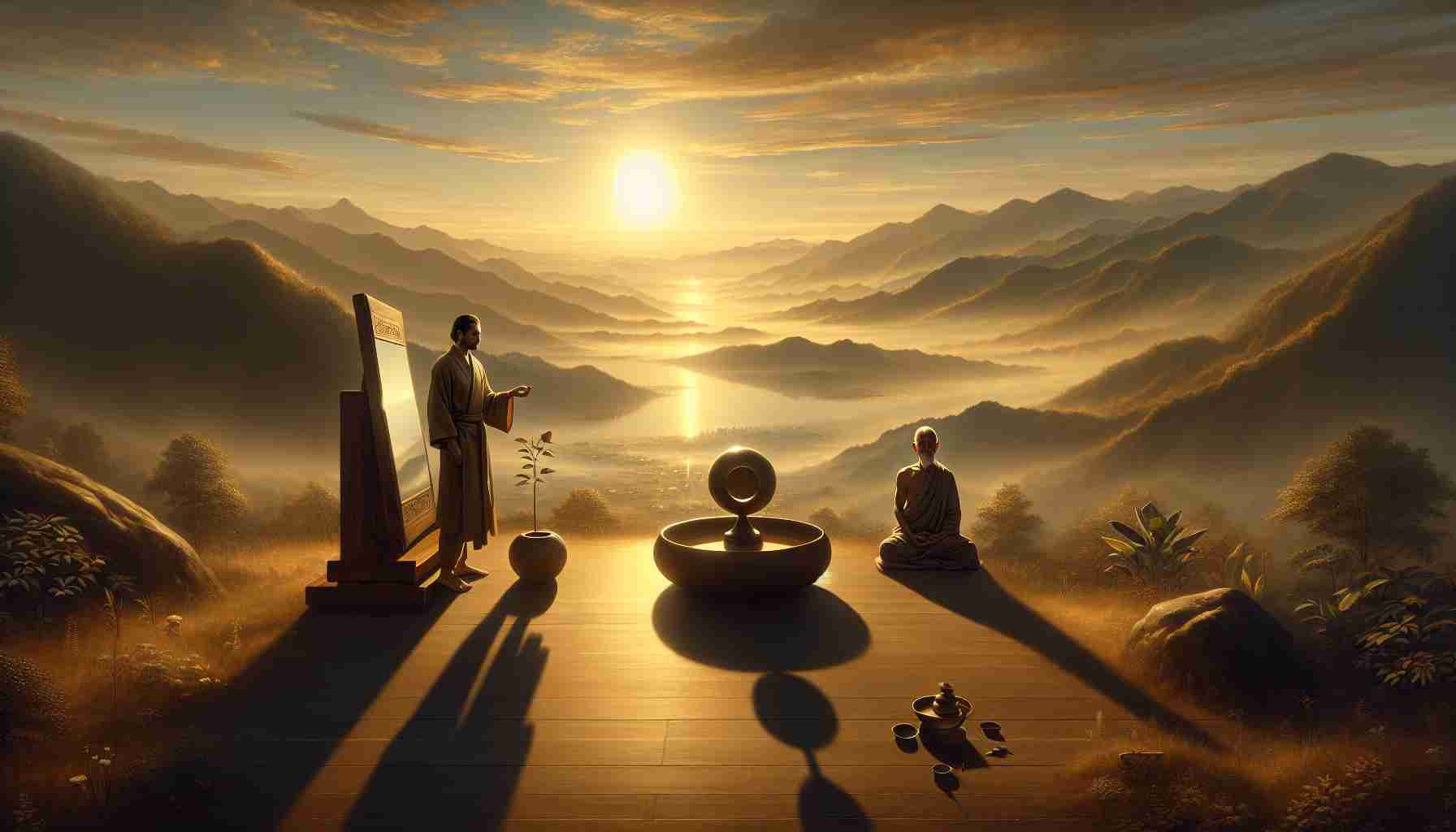

The wind was quiet that morning, and the clouds floated like soft white boats in the sky. I was walking in the mountains, far from the crowded city where I had once lived. My name is Jun, and I had left everything behind—my job, my house, even my name in some ways. I was looking for something, but I didn’t know what.
At the edge of a small cliff, I met an old man who was sitting beside a strange object. It looked like a mirror, but when I looked into it, I saw nothing. Not my face, not the sky, not even light.
“It doesn’t work,” I said.
The old man smiled. “That's where you're wrong. This mirror shows nothing because it holds nothing. It is empty, and in its emptiness, it is perfect.”
I laughed a little. “But what good is a mirror that doesn’t reflect?”
He didn’t answer. Instead, he picked up a cup of water, poured it into a bowl, and then tipped the bowl quickly. The water splashed out and down the rocks, lost forever.
“When you are too full,” he finally said, “you spill over. But when you are empty, you can receive.”
I didn’t understand—not completely anyway—but there was something calming about his words. So I sat with him. For hours, we just breathed.
As the sun began to set, I told him about my life—how I worked hard every day to be better than others, to be seen, to be praised. How I collected things, titles, and worries. I told him how these things made me feel heavy, how I had grown tired of holding everything.
The old man nodded. “You filled your cup hoping to become full… but it only made it harder to move.”
That night, I stayed in a small hut nearby, and I dreamed of a boat—empty, floating down a river. It didn’t have a sail, yet it moved with the current. It bumped into other boats, but no one got mad, because it had no one on board. I watched it glide peacefully, going wherever the water led.
The next morning, I went back to the mirror. I looked again and still saw nothing. But this time, it didn’t bother me. I smiled. Maybe emptiness wasn’t a lack… maybe it was space—space to grow, space to breathe, space to be.
Before I left, the old man handed me a small wooden carving of a boat.
“To remind you,” he said.
Ever since then, I’ve tried to live more simply. I let go of what I don’t need. I leave space in my heart for peace and room in my days for stillness. I don’t rush as much, and I don’t try to be more than I am.
And though the world still rushes around me, I move like the empty boat—quiet, gentle, and free.
I'm still learning. But now, I know that sometimes, having nothing is the best way to hold everything.
The wind was quiet that morning, and the clouds floated like soft white boats in the sky. I was walking in the mountains, far from the crowded city where I had once lived. My name is Jun, and I had left everything behind—my job, my house, even my name in some ways. I was looking for something, but I didn’t know what.
At the edge of a small cliff, I met an old man who was sitting beside a strange object. It looked like a mirror, but when I looked into it, I saw nothing. Not my face, not the sky, not even light.
“It doesn’t work,” I said.
The old man smiled. “That's where you're wrong. This mirror shows nothing because it holds nothing. It is empty, and in its emptiness, it is perfect.”
I laughed a little. “But what good is a mirror that doesn’t reflect?”
He didn’t answer. Instead, he picked up a cup of water, poured it into a bowl, and then tipped the bowl quickly. The water splashed out and down the rocks, lost forever.
“When you are too full,” he finally said, “you spill over. But when you are empty, you can receive.”
I didn’t understand—not completely anyway—but there was something calming about his words. So I sat with him. For hours, we just breathed.
As the sun began to set, I told him about my life—how I worked hard every day to be better than others, to be seen, to be praised. How I collected things, titles, and worries. I told him how these things made me feel heavy, how I had grown tired of holding everything.
The old man nodded. “You filled your cup hoping to become full… but it only made it harder to move.”
That night, I stayed in a small hut nearby, and I dreamed of a boat—empty, floating down a river. It didn’t have a sail, yet it moved with the current. It bumped into other boats, but no one got mad, because it had no one on board. I watched it glide peacefully, going wherever the water led.
The next morning, I went back to the mirror. I looked again and still saw nothing. But this time, it didn’t bother me. I smiled. Maybe emptiness wasn’t a lack… maybe it was space—space to grow, space to breathe, space to be.
Before I left, the old man handed me a small wooden carving of a boat.
“To remind you,” he said.
Ever since then, I’ve tried to live more simply. I let go of what I don’t need. I leave space in my heart for peace and room in my days for stillness. I don’t rush as much, and I don’t try to be more than I am.
And though the world still rushes around me, I move like the empty boat—quiet, gentle, and free.
I'm still learning. But now, I know that sometimes, having nothing is the best way to hold everything.